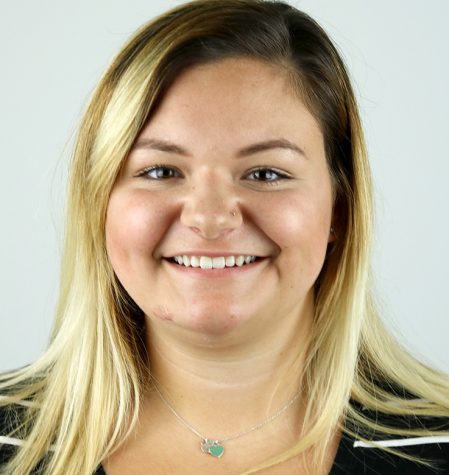Student panel shares experiences growing up Latinx
Brooke Schwartz | The Daily Eastern News
Student panelists discuss ‘What is Latinx?’ Thursday in the Charleston/Mattoon room of the Martin Luther King Jr. Union. Latinx is a gender-neutral term for Latino or Latina.
October 4, 2018
A panel consisting of seven Latinx students was held to discuss experiences growing up as Latinxs Thursday night.
The Latin American Student Organization, the Latin American Studies, the Department of Foreign Languages and the Latino Heritage Celebration Committee held the panel in the Charleston/Mattoon Room of the Martin Luther King Jr. University Union.
The event defined the term Latinx: a gender-neutral term used in place of Latino or Latina.
While there were seven panelists, and only four said they spoke Spanish fluently.
Adam Sandoval, a senior Spanish major, said he did not speak Spanish fluently as a child, and because of that, he was not seen as a “true” Mexican-American.
“I’ve been told, ‘You’re generic,’” he said. “You know, ‘You look like the product, but you don’t have all of the ingredients.’”
Elizette Garza, a junior psychology major, said she had some learning disabilities growing up, which made it harder to learn two languages at once, so she was taught English.
“A lot of people come up to you and say you’re a fake Mexican,” she said. “(Being able to speak Spanish) is not all that the culture is about.”
Dominique Brown, senior psychology major, said she identifies as an Afro-Latina, meaning she comes from African descent and Latino descent.
“When people look at me, they obviously see that I’m black,” she said. “They assume that’s it, so I have to explain that I do come from a Latino culture.”
Diana Argueta, a freshman communication studies major, said she joined LASO because she wanted to make the school more diverse.
“I’ve noticed that Eastern doesn’t have a lot of diversity,” she said. “I want to bring the culture out there.”
Argueta said she finds difficulty when grocery shopping because the Hispanic food section at the grocery store is not big enough.
“I eat a lot of Hispanic foods, because that’s what I grew up eating,” she said. “I was looking at Walmart, and it hurt me that the Hispanic food section was (not big).”
Sandoval said he wondered how he could fight the stereotypes that come with being Latinx and how he could become an advocate, so he joined LASO and got involved to learn more about his culture.
“I turned my (Spanish) minor into a major so I can learn and communicate more and so I can see exactly what made me and what made my parents,” he said. “I’ve got stronger pride for who I am since coming to Eastern.”
Hannah Shillo can be reached at 581-2812 or [email protected].


















































